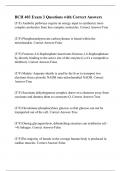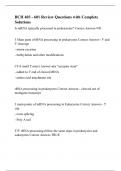Bch 403 - Study guides, Class notes & Summaries
Looking for the best study guides, study notes and summaries about Bch 403? On this page you'll find 56 study documents about Bch 403.
Page 3 out of 56 results
Sort by
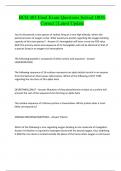
-
BCH 403 Final Exam Questions Solved 100% Correct | Latest Update
- Exam (elaborations) • 22 pages • 2024
-
- $12.99
- + learn more
BCH 403 Final Exam Questions Solved 100% Correct | Latest Update You've discovered a new species of rodent living at a very high altitude, where the partial pressure of oxygen is low. What would you predict regarding the oxygen-binding capacity of this new species? - Answer It's hemoglobin will have a very low P50 value AND The primary amino acid sequence of its hemoglobin will not be identical to that of a species living in an oxygen-rich atmosphere The following peptide is composed of...
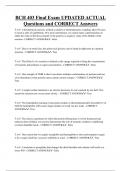
-
BCH 403 Final Exam UPDATED ACTUAL Questions and CORRECT Answers
- Exam (elaborations) • 20 pages • 2024
-
- $9.99
- + learn more
BCH 403 Final Exam UPDATED ACTUAL Questions and CORRECT Answers T or F: A biochemical reaction, without a catalyst or thermodynamic coupling, takes 50 years to reach a state of equilibrium. W/o more information, we cannot make a determination on either the value of the Keq constant or the positive or negative value of the DeltaG of the reaction - CORRECT ANSWER- False T or F: Due to its small size, the amino acid glycine can be found in tight turns in a protein structure - CORRECT AN...
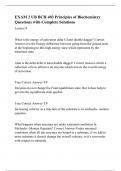
-
EXAM 2 UB BCH 403 Principles of Biochemistry Questions with Complete Solutions
- Exam (elaborations) • 19 pages • 2024
-
- $15.49
- + learn more
Lecture 9 What is the energy of activation delta G knot double dagger? Correct Answer-it is the Energy difference between going from the ground state at the beginning to this high energy state which represents by the transition state what is the delta delta G knot double dagger? Correct Answer-which a reflection of how effective an enzyme which lowers the overall energy of activation. True Correct Answer-T/F Enzymes do not change the Final equilibrium state. But it does help to get int...
BCH 403 Exam 3 Questions with Correct Answers
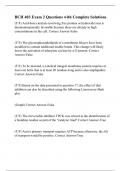
-
BCH 403 Exam 2 Questions with Complete Solutions
- Exam (elaborations) • 12 pages • 2024
-
- $14.49
- + learn more
(T/F) Acid-base catalysis involving free protons or hydroxide ions is thermodynamically favorable because these are already in high concentrations in the cell. Correct Answer-False (T/F) The glycerophosopholipids of a membrane bilayer have been modified to contain additional double bonds. This change will likely lower the activation of adenylate cyclase by a G-protein. Correct Answer-False (T/F) To be inserted, a α-helical integral membrane protein requires at least one helix that is at l...
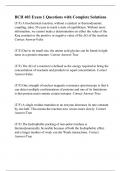
-
BCH 403 Exam 1 Questions with Complete Solutions
- Exam (elaborations) • 12 pages • 2024
-
- $15.49
- + learn more
(T/F) A biochemical reaction, without a catalyst or thermodynamic coupling, takes 50 years to reach a state of equilibrium. Without more information, we cannot make a determination on either the value of the Keq constant or the positive or negative value of the ΔG of the reaction. Correct Answer-False (T/F) Due to its small size, the amino acid glycine can be found in tight turns in a protein structure. Correct Answer-True (T/F) The ΔG of a reaction is defined as the energy required to b...
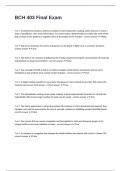
-
BCH 403 Final Exam questions with complete solutions
- Exam (elaborations) • 19 pages • 2024
- Available in package deal
-
- $17.99
- + learn more
BCH 403 Final Exam questions with complete solutions
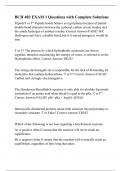
-
BCH 403 EXAM 1 Questions with Complete Solutions
- Exam (elaborations) • 10 pages • 2024
-
- $14.99
- + learn more
PeptideT or F? Peptide bonds behave as rigid planes because of partial double-bond character between the carbonyl carbon of one residue and the amide hydrogen of another residue. Correct Answer-FAlSE! B/C Hydrogen can't have a double bond, but if it stayed nitrogen it would be true. T or F? The process by which hydrophobic molecules are driven together, therefore maximizing the entropy of water, is referred to as the Hydrophobic effect. Correct Answer-TRUE! The strong electronegativity is...
BCH 403 - 601 Review Questions with Complete Solutions
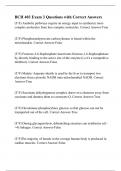
-
BCH 403 Exam 3 Questions with Correct Answers
- Exam (elaborations) • 9 pages • 2024
-
- $16.49
- + learn more
(T/F) Anabolic pathways require an energy input to synthesize more complex molecules from less complex molecules. Correct Answer-True (T/F) Phosphoenolpyruvate carboxykinase is found within the mitochondria. Correct Answer-False (T/F) Fructose-2,6-bisphosphate inactivates fructose-1,6-bisphosphatase by directly binding to the active site of the enzyme (i.e it's a competitive inhibitor). Correct Answer-False (T/F) Malate/ Asparate shuttle is used by the liver to transport two electrons ...

$6.50 for your textbook summary multiplied by 100 fellow students... Do the math: that's a lot of money! Don't be a thief of your own wallet and start uploading yours now. Discover all about earning on Stuvia

